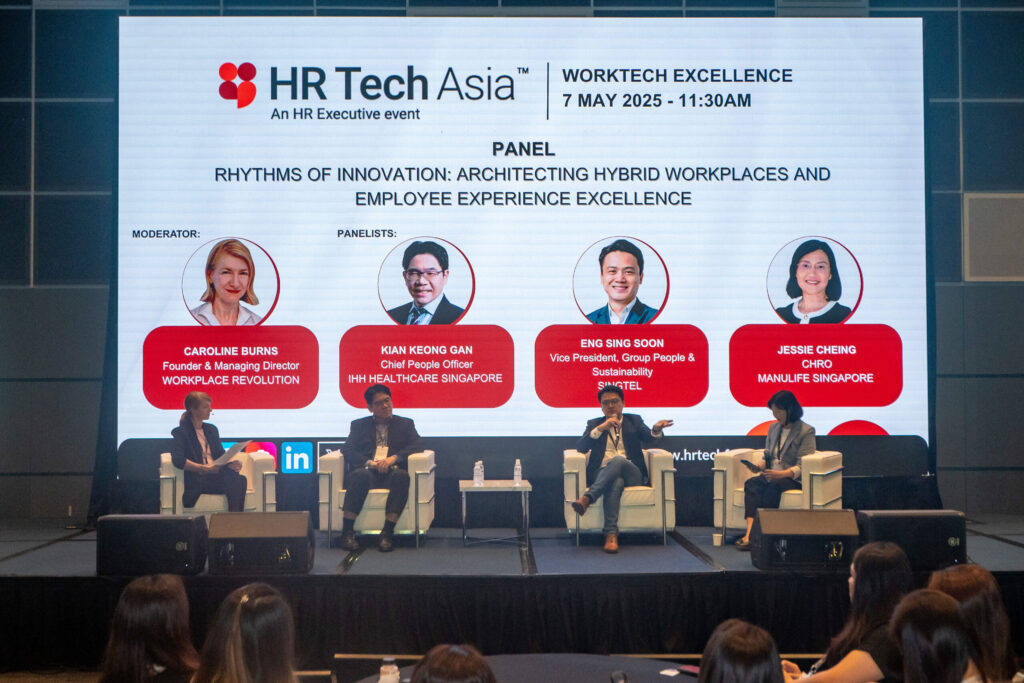Why the contractor boom in Asia-Pacific demands a rethink on talent strategy

The contractor surge in Asia-Pacific signals opportunity but navigating compliance and crafting regionally smart benefits is now essential for growth.
The borderless workforce: Navigating the new era of global hiring in Asia-Pacific

Remote work is reshaping talent strategies across Asia-Pacific, promoting organisations to embrace global hiring, integrated platforms, and flexible workforce models.
Talent crunch in Asia-Pacific drives focus on reskilling and strategic human capital planning

Half of Asia-Pacific executives struggle to attract and retain talent, urging HR to drive digital transformation and human-centred skill development, says Forvis Mazars’ Iris Goh.
Calls grow for flexible options as Malaysia considers raising retirement age

Malaysia’s proposal to raise the retirement age to 65 sparks calls for flexibility to support both older and younger employees.
Day 2 of HR Tech Asia 2025: Rethinking talent, work, and the human element

HR Tech Asia 2025 spotlighted empathy, agility, and purpose as key drivers of transformative talent strategies and future-ready workplaces.
Employers in Singapore urge bold action to turn ageing population into economic gain

Singapore is positioning itself to turn the challenge of an ageing workforce into an opportunity through inclusive, flexible employment strategies.
The wellbeing virtuous cycle

The business case for supporting employees’ wellbeing beyond the workplace.
South Korea bottoms global ranking for remote work, study reveals

Rigid work cultures in South Korea are limited remote work and flexibility with consequences for family life, birthrates, and business.
Malaysia to establish tripartite council to address wages in gig economy

Malaysia’s Gig Workers Bill nears completion, aiming to ensure fair wages and social protection without stifling sector growth.
Shaping tomorrow’s workplace: Worktech Excellence track to lead conversations at HR Tech Asia 2025

HR Tech Asia 2025’s Worktech Excellence track explores how technology, space, and culture converge to shape the future of work.
Flexible meal solutions: The missing ingredient in workplace productivity

Flexible meal options are emerging as a vital workplace benefit, reshaping how organisations support employee wellbeing and productivity.
Quantifying the unseen: Menopause and its impact in the APAC workplace

Ignoring menopause in the workplace risks losing experienced female leaders, disrupting knowledge transfer, and weakening innovation—jeopardising long-term organisational resilience.
Singapore’s manpower ministry charts strategic shifts to prepare workforce for future of work

Singapore’s Ministry of Manpower is making strategic shifts to futureproof its workforce amid technological disruption and demographic change.
Personal happiness found to be the key to workplace satisfaction

People with higher life satisfaction are 32% more likely to experience lasting job satisfaction, highlighting the importance of holistic wellbeing strategies.
A human-centric approach to AI integration in HR

From hiring to retention, AI is redefining HR processes, offering opportunities to enhance efficiency while prioritising human connection.
Covid-19, five years later: Why HR is ‘still recovering’

As the anniversary of the US shutdown approaches, one HR leader advises that it is critical for HR to say, “What are the lessons we learned?”
Middle management crucial to empowering women’s health at work

Women in the workforce face unique challenges, from stress to fertility concerns—yet these issues remain underdiscussed in workplaces.
Singapore expands support for flexible work and reskilling

More organisations in Singapore are embracing flexible work arrangements as the government expands support for reskilling and strengthens workplace fairness policies.
IWD 2025: Building pathways for women’s career comeback

Women re-entering the workforce face unique challenges, but Temus’ Melissa Kee highlights how organisations can help them overcome these barriers.
Beyond budget boost: Workplace revolution to support large families

Singapore’s Large Families Scheme aims to support parents, but workplace culture must evolve to empower parents in caregiving roles.
The steward leader: How HR can drive purpose and profit in 2025 and beyond

As work undergoes rapid transformation, HR leaders must rethink leadership. Enter Steward Leadership—a model bridging purpose, profit, and sustainability.
Employers in Singapore show strong readiness for flexible work arrangements, survey finds

Younger employees drive a strong shift towards flexible work, with larger firms embracing it strategically while smaller businesses face challenges.
Flexible work conditions help overqualified employees achieve work-life balance

Overqualified employees thrive with flexible work arrangements, leading to better work-life balance and stronger family support, new research reveals.
New Zealand eases visa rules to attract digital nomads

New Zealand eases visa rules, inviting digital nomads to work remotely for up to 90 days to boost tourism and the economy.
Employee experience key to Vietnam’s HR growth

Continuing the discussion about HR in Vietnam, RMIT University Vietnam’s Elaine Chew explores how blending cultural values with modern practices shapes employee experience and organisational success.
Employee vitality key to talent retention amidst Singapore’s skills shortage

High-vitality employees report greater job satisfaction, engagement, and productivity, highlighting vitality as a game-changer for Singapore’s competitive talent landscape.
Toyota mandates return to office for North American salaried staff

Toyota’s RTO mandate emphasises mentoring, growth, and culture, aligning with trends among major employers like Amazon and JPMorgan Chase.
Singapore’s talent paradox: Employers seek tech wizards, jobseekers prioritise practicality

Balancing high-tech hiring with jobseekers’ preference for practical roles is the key challenge facing HR in Singapore’s evolving job market.
How Singapore’s new FWA guidelines shape the future of business

Deel’s Karen Ng highlights how Singapore Tripartite Guidelines on FWA positions organisations to attract global talent and foster agility.
Five ways HR leaders can hire with purpose in 2025

Hiring strategies for 2025 need to look a bit different than in previous years, as factors including AI and the demand for flexibility are changing the game.
